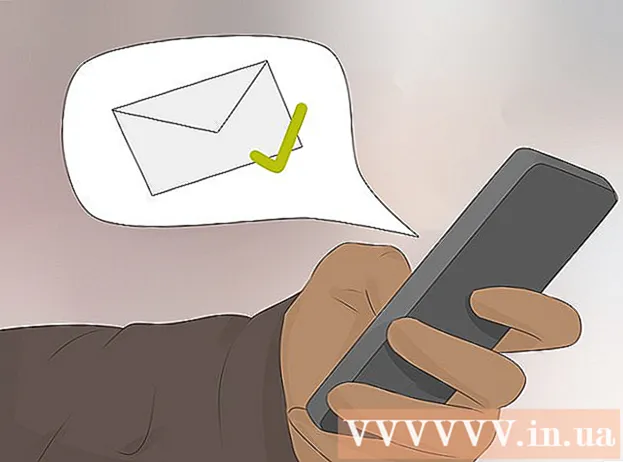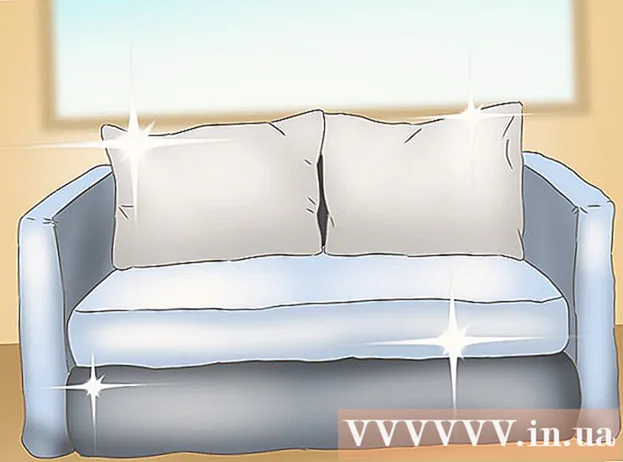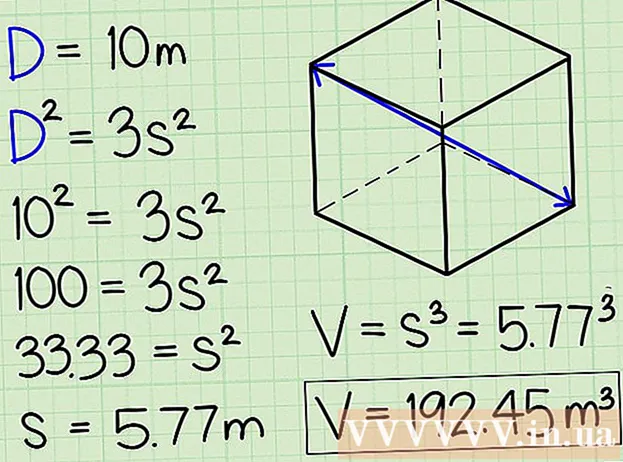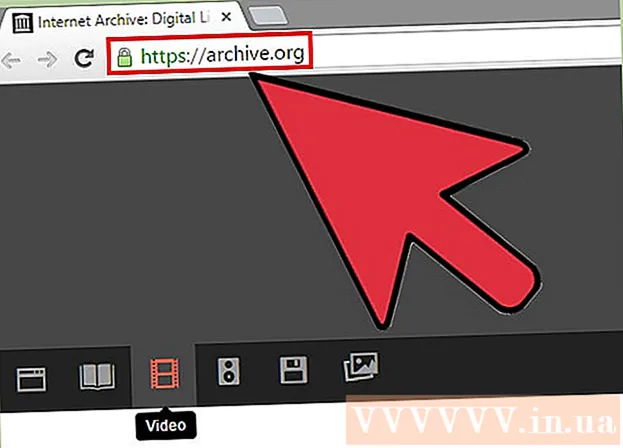Author:
Louise Ward
Date Of Creation:
3 February 2021
Update Date:
1 July 2024

Content
Nasal polyps are soft, non-cancerous tumors that can form in the sinus cavities and nose. Although it is painless, if it grows large, the polyps can interfere with your airways, making it difficult to breathe, and affecting your sense of smell. There is no complete cure, as polyps often return if you are prone to polyps. However, there are many medical and lifestyle measures you can take to shrink or eliminate polyps and reduce the risk of further polyps forming.
Steps
Part 1 of 3: Treatment of nasal polyps with medical measures
See your doctor if you have symptoms of nasal polyps. Usually, nasal polyps have no symptoms and you may not even know they exist. However, as polyps develop, you may experience complications and need medical attention. See your doctor to see if you have nasal polyps if you have the following symptoms. If you test and confirm that you have nasal polyps, your doctor will recommend some medical treatment.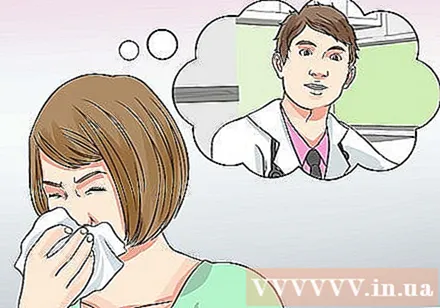
- A runny or stuffy nose.
- Decreased smell and taste.
- Pressure in the forehead or face.
- A feeling of a stuffy nose even though there is no mucus.
- Headache.
- Upper teeth pain.
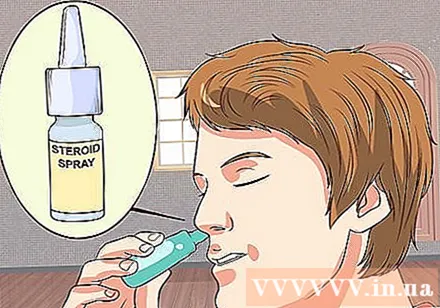
Use steroid sprays. Steroid sprays can help reduce the size of the nasal polyps. If the polyps are small enough, they may disappear completely with steroid sprays. Some steroid sprays are sold over-the-counter in pharmacies. Stronger drugs require a prescription from your doctor. Talk to your doctor about steroid sprays and see if they are working.- Some popular steroid sprays include Beclomethasone, Budesonide, Fluticasone, Mometasone, and Triamcinolone. Nasonex is the most popular brand of steroid sprays.
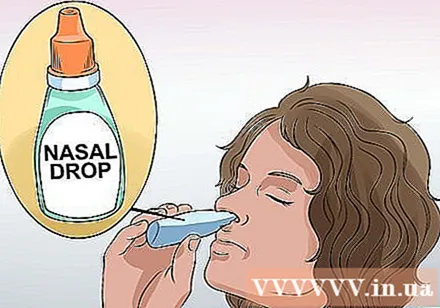
Try steroid nasal drops. Like sprays, steroid nasal drops help shrink polyps. Nasal drops can also help relieve congestion so that you can breathe easily while the polyps are shrinking. Most nasal drops take 7-14 days to start shrinking polyps and it is often recommended to continue to use for another four to six weeks.- When instilling, you should tilt your head completely back. Tilt your head back almost like it was facing the ground. Put the medicine in the nose while the head is facing down. Hold for 3 to 4 minutes after the instill so the medicine can flow to the nasal passages.
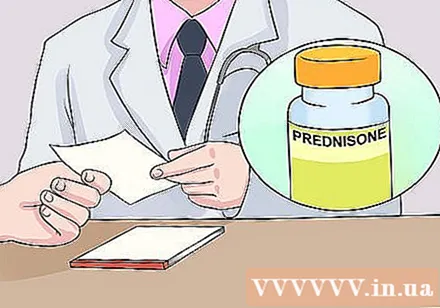
Take Prednisone. Prednisone is an oral corticosteroid that helps reduce swelling and inflammation. It can help treat inflammation in the nose, thereby reducing the size of the nasal polyps. Prednisone can only be purchased with a prescription from your doctor. Usually, a doctor will prescribe medication for 7-10 days.
Take an antibiotic. While they do not help reduce polyps, antibiotics can help treat complications caused by polyps. Polyps blocking the cavities of the sinuses can cause a sinus infection caused by bacteria. If you have a sinus infection from polyps, your doctor will prescribe antibiotics to fight the infection.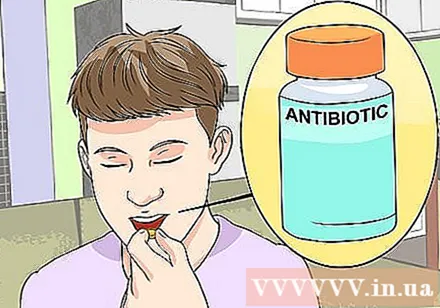
Consider surgery. The above treatments only help shrink polyps. The only way to get rid of polyps completely is with surgery. If the polyps persist and are making you too uncomfortable, your doctor may suggest a surgical option. To surgically remove polyps, you may have to get laparoscopic sinus surgery.A long lighted endoscope and a video camera at the tip will be inserted into one nostril and various other tools will be used to remove nasal polyps. You will receive anesthesia at the time of surgery. Usually, you can go home right after surgery.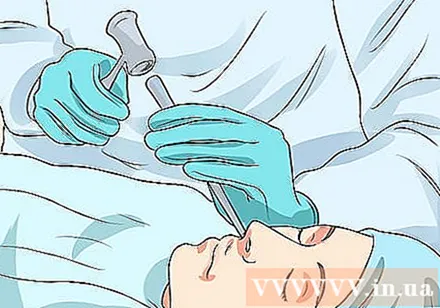
- Remember, in some cases, nasal polyps can return after 2-3 years.
Part 2 of 3: Prevent polyps from growing with home remedies
Use normal saline to clean your nose and sinuses. Salt water can help reduce inflammation in the nose and dry out mucus that is causing congestion. Salt helps slow down the production of adiponectin (inflammatory chemicals) in the body.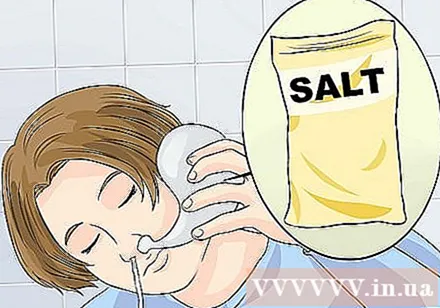
- You can mix half a teaspoon (or less) of table salt in a cup of boiling water and wait for it to cool. Pour the salt water mixture into a clean bottle or a Neti Pot (used exclusively to wash your nose) to clean your nose and sinuses.
Try a steam bath. Breathing steam through your nose helps to clear your airways and thin thick mucus caused by nasal congestion. There are many ways to use a steam bath.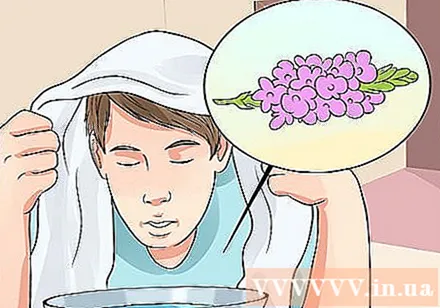
- Close the windows and doors of the bathroom and turn on the hot water to create your own sauna.
- Boil a pot of water. Fill a large bowl with boiling water. Cover your head and neck with a towel, then place your face over a bowl of hot water to let your nose inhale the steam. Make sure the towel covers the head and the entire bowl to prevent the water from escaping. Take a deep breath in so you can feel the steam in your nose. Continue steaming until the water cools.
- You can add a few drops of essential oils such as peppermint and eucalyptus essential oils to the water for an extra cleansing effect.
Eat horseradish and honey to clear your sinuses. Eating horseradish is a natural way to clear your sinuses. Horse radish has antibacterial and flavorful properties that help open up the airways, while reducing the size of the polyps. Try some horseradish. If you don't like the pungent smell, you can combine horseradish with honey.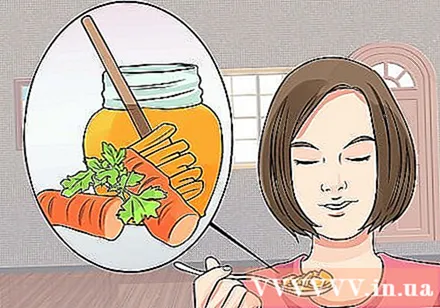
- You can combine 200 mg of horseradish (about 2 cups) with 2 cups of honey. Store the mixture in the refrigerator. Every day, eat a teaspoon of the mixture in the morning, one spoon in the evening until the sinuses clear and the polyps start to shrink.
Increase your intake of garlic and onions. Both garlic and onions have antifungal and antibacterial properties that help dilate the nasal glands and shrink the polyps. Garlic and onions contain quercetin, which helps to reduce inflammation.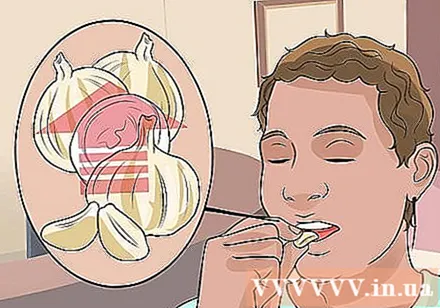
- Eat 2 fresh garlic cloves or a few pieces of onion twice daily for a week. If you don't like the taste of fresh garlic and onions, you can take a supplement.
The herbal supplement Xanthium. This is an herb from East Asia also known as "Fructus Xanthii" in Traditional Chinese Medicine. Herbs have been used to treat nasal polyps for centuries. Xanthium has anti-inflammatory properties against nasal polyps. Experts suggest that Fructus Xanthii works by partially suppressing the inflammatory system.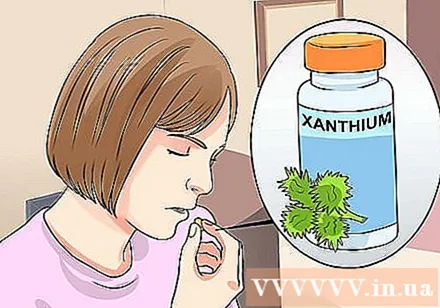
Try taking yellow rose flowers supplement. This herb is also known as Hydrastis Canadensis. Yellow lily is a North American plant that has anti-inflammatory and antibacterial properties. Herbs contain chemicals like berberine and hydrastine that help reduce inflammation.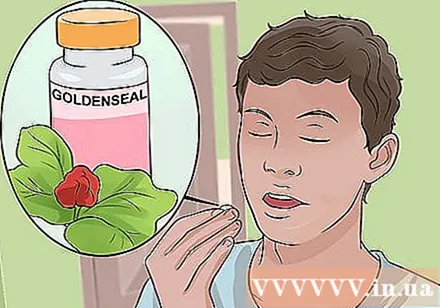
- Pregnant women should not use the capillaries because it can adversely affect the uterus.
Use a diluted Capsium Annuum chili spray. This pepper is used in traditional medicine to promote capillary health and increase blood circulation as well as reduce polyps. You can buy diluted Capsium chili products that help ease nasal pain and shrink polyps.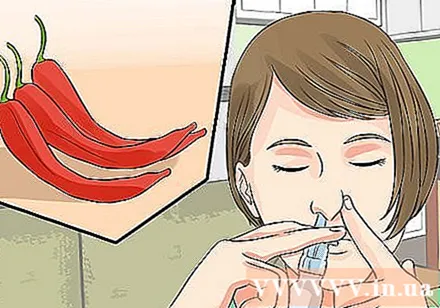
- Make sure the spray is diluted to avoid irritating your nose. In addition, do not allow Capsium to come into contact with eyes or open wounds.
Break down mucus with magnolia. Magnolia is a deciduous tree with bark and flowers that help shrink polyps. Bark has mucus-dissolving properties, which means it breaks down mucus that causes a stuffy nose. Magnolia flowers have astringent properties, which means astringent nasal mucosa, reducing polyps.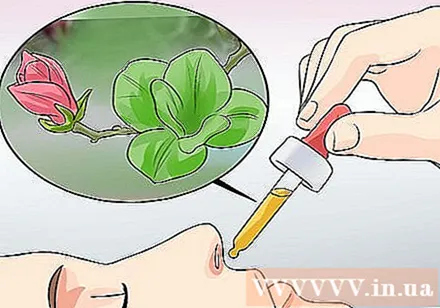
- People with constipation or digestive problems should not use magnolia.
Part 3 of 3: Strengthen your immune system to stop polyps from growing
Get enough sleep. The rest of the body can fight disease and infection more effectively when it comes to overwork and fatigue. Be aware of your limits. You may think that you can stay up all night to get a job done, but the immune system actually has the consequences. Therefore, it is best to get 7-9 hours of sleep per night. Even a short rest when you are tired can help your immune system work better.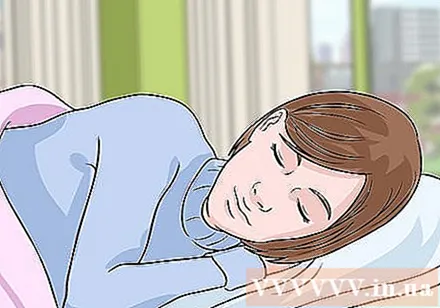
Eat a balanced diet. To boost the health of the immune system, you need to get all the necessary nutrients. The amount of nutrients needed will depend on your weight, age and health conditions. You can talk to your doctor about how to plan a meal or consult other articles on what to eat.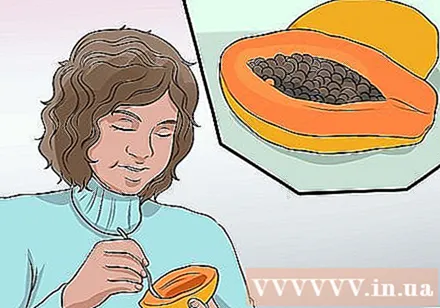
- Try to incorporate lean protein, whole wheat carbohydrates, unsaturated fats, non-fat dairy products, and a variety of fruits and vegetables into your daily diet.
- Get 500-1000 mg of vitamin C per day. Vitamin C helps the immune system be healthy and function better. When you don't get enough vitamin C, your immune system suffers, leading to a higher risk of disease or infection. Foods rich in vitamin C include oranges, lemons, guava, kiwi, strawberries, and papaya.
Exercise every day. To keep your body, including your immune system, healthy, you should exercise for at least 30 minutes, 3-4 times per week. Exercise helps speed up metabolism and boost the health of the immune system. You should do exercises that are good for the heart muscle, lift weights, and increase endurance.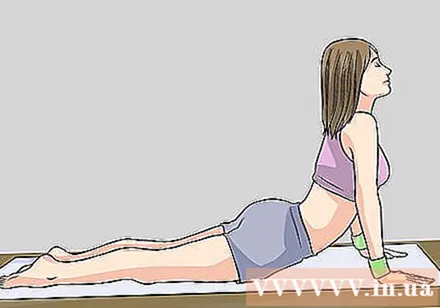
- Exercises that are good for the heart muscle include running, hiking, biking, swimming, and walking.
- Strength and endurance exercises include yoga, weightlifting, and stretching.
Advice
- Keep in mind that polyps can come back even after removal by surgery. Therefore, you must always strengthen your immune system and take home remedies to prevent the polyp from returning.
Warning
- See your doctor right away if you have difficulty breathing due to nasal polyps.
- Always consult with your doctor before trying a new herb or changing your lifestyle.
